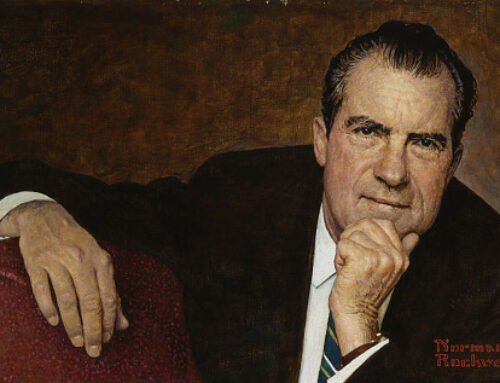Lyndon B. Johnson, also known as LBJ, was the 36th President of the United States, serving from 1963 to 1969. He was born in a small farmhouse in Stonewall, Texas, in 1908 and grew up in a poor family. Despite these humble beginnings, Johnson was a brilliant and ambitious young man, and he worked hard to obtain a good education.
After completing his studies, Johnson entered politics and quickly rose through the ranks. He served in the U.S. House of Representatives and later as a U.S. Senator from Texas. In 1960, he was elected Vice President under President John F. Kennedy.
Tragically, Kennedy was assassinated in 1963, and Johnson became President. As President, LBJ is perhaps best known for his efforts to address issues of civil rights and poverty. He signed the Civil Rights Act of 1964, which banned discrimination based on race, color, religion, sex, or national origin, and he also signed the Voting Rights Act of 1965, which ensured that African Americans had the right to vote.
In addition to these significant domestic policy achievements, Johnson also oversaw the escalation of U.S. involvement in the Vietnam War. This decision proved to be controversial, and it ultimately contributed to his decision not to seek re-election in 1968.
After leaving office, Johnson returned to his ranch in Texas, where he died in 1973. He is remembered as a tireless advocate for civil rights and an effective leader who worked to improve the lives of Americans.
If you converted both of their wealth, James madison and Lyndon B johnson can be easily comparable. This was my shock. But after reading about his wealth, I can say that Yes He was one of the wealthiest presidents of the United States. Exact contradiction to his predecessor.
Here I want to quote One article from 1973, After his death, Which highlights many things. That also highlights some lessons.
Johnson, Virtually Penniless in 1937, Left a Fortune Valued at $20‐Million
AUSTIN, Tex., Jan. 27 —By the time of his death last Monday, Lyndon B. Johnson and his wife had built a sizable family fortune. Mr. Johnson’s will has not been filed for probate, but the worth of the family holdings could exceed $20‐million.
The will, when it is filed, will probably not disclose much about the family finances. Most of the property has already been deeded to a family‐owned corporation or individual family members.
But a check of public records over the years indicates that Mr. Johnson, who was virtually penniless when he wooed Claudia (Lady Bird) Taylor in 1937, had become wealthy and was one of the largest land owners in the central Texas hill country when he died.
With members of his family, he owned several ranches, held major blocks of stock in numerous banks, controlled a chain of radio stations and was engaged in developing lakeside subdivisions.
The basis of the family fortune was a small radio station, KTBC in Austin, which the Johnsons bought in 1943 with money Mrs. Johnson inherited from her father.
Mrs. Johnson Credited
During his lifetime, Mr. Johnson always gave credit for the growing family fortune to his wife, maintaining that Mrs. Johnson ran the business while he devoted his time to government service.
And, indeed, title to many of the assets of the Johnson family has been in her name and those of the two Johnson daughters, and later in a series of corporations—the LBJ Company, and the Texas Broadcasting Company.
Records show that when family property was sold or transferred it was often Mr. Johnson who signed the papers, even though on record the property was owned by somebody else.
The bulk of the Johnson famuily fortune grew directly from the small radio station that Mrs. Johnson paid $17,500 for. She bought it from a company headed by Robert B. Anderson, who was later Secretary of the Navy and of the Treasury during the Administration of President Eisenhower.
The link to the Article is here
So what are the lessons? Succession money is not bad. Who should inherit your Wealth? and how to use Financial Windfall for Better Financial Position is the blog post which I wrote about in deep. In that post, I also wrote that inheritance money if not managed well, makes the person who received it bankrupt. But what if you managed it well? Lindon B johnson is a perfect example.
A financial windfall is a sudden and unexpected large amount of money or financial gain. This can come in many forms, such as inheritance, lottery winnings, a settlement, or even an investment that pays off big. A financial windfall can have a significant impact on one’s life and can change the financial trajectory at a moment’s notice.
Pros of a Financial Windfall
- Improved Financial Stability and Security: A financial windfall can provide an individual with a sense of financial stability and security, reducing the stress and worries associated with financial difficulties.
- Pay Off Debt: A financial windfall can also provide an individual with the opportunity to pay off debt, which can free up more of their income each month and allow them to save more for the future.
- Investment in Assets: A financial windfall can also be invested in assets, such as real estate or stocks, which can secure one’s financial future and provide long-term growth.
- Fulfill Long-Held Dreams and Desires: With a financial windfall, individuals can finally fulfill long-held dreams and desires, such as traveling the world, starting a business, or even retiring early.
- Improved Quality of Life: A financial windfall can also lead to an improved quality of life, allowing individuals to enjoy more leisure activities, purchase luxury items, and live a more comfortable lifestyle.
Cons of a Financial Windfall
- Difficulty in Handling a Large Sum of Money: A financial windfall can be overwhelming and difficult to manage, especially if the individual is not used to having a large amount of money at their disposal.
- Risk of Overspending and Financial Mismanagement: A financial windfall can also lead to overspending and financial mismanagement, as individuals may not know how to handle the sudden influx of cash.
- Risk of Attracting Unwanted Attention: A financial windfall can also attract unwanted attention, such as from con artists or scammers, who may attempt to take advantage of the individual’s newfound wealth.
- Negative Impact on Personal Relationships and Social Life: A financial windfall can also hurt personal relationships and social life, as friends and family members may become envious or resentful of the individual’s newfound wealth.
- Difficulty in Adjusting to New Financial Status and Lifestyle Changes: A financial windfall can also be difficult to adjust to, as individuals may find it challenging to get used to their new financial status and lifestyle changes.
In conclusion, a financial windfall can have a significant impact on an individual’s life, bringing both pros and cons. Individuals need to manage their windfall wisely and seek professional financial advice to help them make informed decisions and avoid financial pitfalls.




